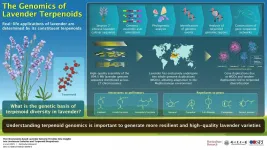Weighted "lottery" provides greater access to scarce COVID-19 medications
2021-05-16
(Press-News.org) ATS 2021, New York, NY - A weighted "lottery" designed to increase access to the antiviral drug remdesivir during the May-July 2020 COVID-19 surge for those most affected by the coronavirus, including members of the Black, Latinx and indigenous communities, led to more equitable distribution of the badly needed medication, according to research presented at the ATS 2021 International Conference.
At a time when supplies of COVID-19 medications were scarce, Douglas B. White, MD, MAS, vice chair and professor of critical care medicine, UPMC endowed chair for ethics in critical care medicine and director of the Program on Ethics and Decision Making in Critical Illness, University of Pittsburgh School of Medicine, and colleagues, convened a multi-institution consortium of experts to develop a weighted lottery, in which some patients would be given higher priority for receiving remdesivir while others would be given lower priority.
Consortium members had expertise in bioethics, economics, health disparities, medicine, pharmacy and health law. They assigned more weight to patients from disadvantaged communities and essential workers, and less weight to patients expected to die within a year from a terminal condition and those with severe respiratory failure.
The lottery was implemented at 23 hospitals across the UPMC health system during periods of drug shortage. The team identified eligible patients using an electronic health record- and telephone-based screening system. They calculated the number of potentially eligible patients each week, based on the number of patients who were eligible the previous week. Using the weighting system previously described, a drug allocation team met each day to determine each eligible patient's chance of receiving the drug, and then used a random number generator to run the lottery.
Overall, 61 percent of the available remdesivir was allocated to patients who were from disadvantaged neighborhoods and/or were essential workers. These individuals made up 56 percent of the COVID-19 patient population.
"We showed that in the maelstrom of a pandemic it is possible to deploy an organized allocation strategy that promotes both equity and clinical benefit," said Dr. White.
"This is a major improvement over the first-come, first-served approach that many hospitals have used; that approach is likely to worsen disparities for those with access-to-care barriers. Among those most affected would be persons with disabilities that limit their mobility and those without health insurance, who may delay seeking care due to financial concerns."
He noted that the weighted lottery also allows planners to give priority to certain groups, such as those who are most likely to benefit and those who have been disproportionately affected by the pandemic, such as individuals from hard-hit communities.
"It was our goal from the outset to develop a framework and process that any hospital can use," stated Dr. White. The team also developed a detailed protocol that describes the steps to carry out the lottery, which can be found here.
The researchers concluded that it is best to implement the lottery on a centralized, regional level, rather than hospital-by-hospital. "It is far more efficient to conduct one lottery for many hospitals than have each hospital conduct its own lottery. This approach can simultaneously accomplish fair allocation and rapid learning, because the lottery creates a natural experiment in which some patients receive the scarce drug while others do not. Researchers can use the lottery's registry to assess the effectiveness of the drug." This is described in detail in this article.
VIEW ABSTRACT
INFORMATION:
ELSE PRESS RELEASES FROM THIS DATE:
2021-05-16
WINSTON-SALEM, N.C. - May 16, 2021 - Heart failure (HF) - when the heart can't pump enough blood and oxygen through the body - affects approximately 6.2 million adults in the United States and is the primary cause of hospitalization in the elderly. Unfortunately, older adults with heart failure often have poor outcomes resulting in reduced quality of life, high mortality and frequent rehospitalizations.
Despite many efforts to improve the prognosis in these patients, most previous studies testing a wide range of interventions were not successful.
Scientists from the Wake Forest, Duke University and Thomas Jefferson ...
2021-05-16
An innovative cardiac rehabilitation intervention started earlier and more custom-tailored to the individual improved physical function, frailty, quality-of-life, and depression in hospitalized heart failure patients, compared to traditional rehabilitation programs. Supported by the National Institute on Aging (NIA), part of the National institutes of Health, these new study results were published May 16 in the New England Journal of Medicine and also presented at the American College of Cardiology's 70th Annual Scientific Session.
"Designing earlier and more personalized individual-specific approaches to heart failure rehab shows great promise for improving outcomes for this common but complex condition that is ...
2021-05-16
The investigational drug evinacumab reduced triglycerides in patients with severe hypertriglyceridemia (sHTG) and a history of hospitalizations for acute pancreatitis in a phase 2 global study led by Mount Sinai. The fully human monoclonal antibody produced sustained reductions in triglyceride levels of up to 82 percent, depending on the patient's genotype, while also lowering the risk of recurrent acute pancreatitis. The results of the study will be presented as a late-breaking clinical trial at the American College of Cardiology (ACC) Annual Scientific Session, on May 16.
"Evinacumab has the potential to not only lower triglycerides, but the risk of acute pancreatitis, quality of life, and the risk of cardiovascular events in ...
2021-05-15
Hamilton, ON (May 15, 2021) - A simple surgery saves patients with heart arrhythmia from often-lethal strokes, says a large international study led by McMaster University.
Researchers found that removing the left atrial appendage -- an unused, finger-like tissue that can trap blood in the heart chamber and increase the risk of clots -- cuts the risk of strokes by more than one-third in patients with atrial fibrillation.
Even better, the reduced clotting risk comes on top of any other benefits conferred by blood-thinner medications patients with this condition are usually prescribed.
"If you have atrial fibrillation and are undergoing heart surgery, the surgeon should be removing your left atrial appendage, because it is a set-up for forming clots. Our trial has shown ...
2021-05-15
Researchers at Rutgers Robert Wood Johnson Medical School are reporting the first instance of COVID-19 triggering a rare recurrence of potentially serious blood clots in people's arms.
The discovery, published in the journal Viruses, improves the understanding of how inflammation caused by COVID-19 can lead to upper extremity blood clots and how best to treat them. The case study is part of a larger Rutgers study of 1,000 hospitalized patients diagnosed with COVID-19 who were admitted and discharged between March and May 2020.
While there have been reports of lower extremity deep vein thrombosis following COVID-19, ...
2021-05-14
Next-generation sequencing technology has made it easier than ever for quick diagnosis of plant diseases. "It's really exciting to see how sequencing technologies have evolved and how this new technology facilitates sequencing of entire genomes in such a short amount of time," said Yazmín Rivera, a plant pathologist with the United States Department of Agriculture's Plant Protection and Quarantine program, who recently published a research paper on the efficacy of Oxford Nanopore Technologies protocols.
"We wanted to provide an unbiased assessment of the technology and protocols available for long read sequencing," Rivera explained. Along with other plant pathologists, Rivera used the company's protocols to prepare RNA and DNA libraries from virus-infected plant material ...
2021-05-14
People with a high polygenic risk score for colorectal cancer could benefit more at preventing the disease by leading healthy lifestyles than those at lower genetic risk, according to a study by Vanderbilt researchers published in the April issue of The American Journal of Clinical Nutrition.
Analyzing data from participants in the UK Biobank, the researchers estimated that maintaining a healthy lifestyle was associated with a nearly 40% reduction in colorectal cancer risk among those with a high genetic risk of developing the disease. The percentage dropped to only about 25% among people at ...
2021-05-14
Dozens of commonly used drugs, including antibiotics, antinausea and anticancer medications, have a potential side effect of lengthening the electrical event that triggers contraction, creating an irregular heartbeat, or cardiac arrhythmia called acquired Long QT syndrome. While safe in their current dosages, some of these drugs may have a more therapeutic benefit at higher doses, but are limited by the risk of arrhythmia.
Through both computational and experimental validation, a multi-institutional team of researchers has identified a compound that prevents the lengthening of the heart's electrical event, or action potential, resulting in a major step toward safer use and expanded therapeutic efficacy of these ...
2021-05-14
Extracting hydrogen from water through electrolysis offers a promising route for increasing the production of hydrogen, a clean and environmentally friendly fuel. But one major challenge of water electrolysis is the sluggish reaction of oxygen at the anode, known as the oxygen evolution reaction (OER).
A collaboration between researchers at Hunan University and Shenzhen University in China, has led to a discovery that promises to improve the OER process. In their recent paper, published in the KeAi journal Green Energy & Environment, they report that etching - or, in other words, chemically removing - the oxide overlayers that form on the surface of the metal phosphide electrocatalysts regularly used in electrolysis, can increase ...
2021-05-14
Even the mention of lavender evokes the distinct fragrance of the flower. This beautiful flower has been used to make perfumes and essential oils since time immemorial. The aesthetics of the flower have captured the imagination of hundreds, worldwide. So, what makes this flower so special? What are the "magical" compounds that gives it its unique fragrance? What is the genetic basis of these compounds? These questions have long puzzled scientists.
To find out the answers, a group of scientists from China have sequenced the genome of lavender, which is known in the scientific world as Lavandula angustifolia. The team headed by Dr. Lei Shi, Professor at the Key Laboratory of Plant Resources and Beijing Botanical Garden, Institute of Botany, Chinese ...
LAST 30 PRESS RELEASES:
[Press-News.org] Weighted "lottery" provides greater access to scarce COVID-19 medications




